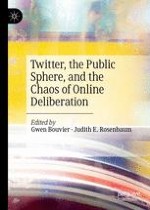2020 | OriginalPaper | Chapter
13. Afterword: Twitter and the Democratization of Politics
Authors : Gwen Bouvier, Judith E. Rosenbaum
Published in: Twitter, the Public Sphere, and the Chaos of Online Deliberation
Publisher: Springer International Publishing
Activate our intelligent search to find suitable subject content or patents.
Select sections of text to find matching patents with Artificial Intelligence. powered by
Select sections of text to find additional relevant content using AI-assisted search. powered by
